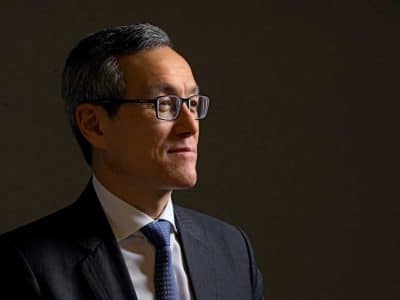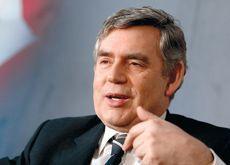London’s ‘leper’ bankers defend their right to make money as Britain’s general election looms.
Under the stained-glass gaze of William Shakespeare, Charles Cara struggles to defend another British icon: the City of London.
“How do you make the case that making money is good if losses get nationalised?” Cara, an analyst at Absolute Strategy Research Ltd, said at a January 14 conference in a Victorian school hall by the River Thames now occupied by JPMorgan Chase & Co. “The banking crisis has shown that there are costs, and those costs tend to get thrown onto the citizen.”
Bankers in London’s financial centre, which mayor Boris Johnson called a “leper colony,” are battling to justify their right to make money and to prove their social value after British taxpayers assumed liabilities of more than £800bn ($1.23 trillion) to bail out the country’s lenders. With elections less than four months away, a debate once confined to universities and churches has become more than academic.
Prime minister Gordon Brown, whose ruling Labour Party wooed financiers before and after taking office in 1997, and opposition Conservative leader David Cameron are turning publicly on the City, Europe’s largest financial centre and a focus of trade for almost 2,000 years.
Brown lambasted the “bankrupt ideology” of free market “fundamentalism” at his party’s conference in September and pledged to make banks “the servant of people.”
In October, Cameron vowed to promote “quality of life” as well as “quantity of money.” He wouldn’t change Brown’s decision to raise the rate of income tax for the highest earners to 50 percent. “The rich will pay their share,” he said.
“There is a crisis of values and of value,” Ken Costa, chairman of investment bank Lazard International, said in a January 19 lecture in the City. “Politically and socially it has certainly corroded trust in financial institutions and those thought to run and regulate them.”
Financial services employ one million Britons and accounted for 10.1 percent of the UK’s gross domestic product and 27.5 percent of corporate taxes in 2007, according to the government and PricewaterhouseCoopers LLP.
Yet three decades after former Prime Minister Margaret Thatcher won power by campaigning for free markets and against labor unions, Britain’s main political parties are distancing themselves from the City.
“For many, the City has been opaque, shrouded in mystery, revealing itself only to announce enormous profits or to deal with some form of scandal,” UK Treasury minister Paul Myners, a former fund manager, said in a November debate. “Now the City is in the limelight again, and again for the wrong reasons.”
Bankers have been cast as “pariahs” working in a “leper colony,” Mayor Johnson told fellow members of the Conservative Party at their annual conference in October.
Politically, the City is in a “very strange period,” Nick Anstee, the 682nd lord mayor of the City of London, said in an interview. Lawmakers are currying favour with the electorate by attacking the banks, he said.
“And that is singularly unacceptable,” Anstee said. “Particularly in fact because some politicians need to look at themselves and wonder at the extent to which they were culpable and responsible for what has happened.”
Politicians from both the Labour and Conservative parties are calling for tougher regulation after what the government once heralded as the U.K.’s “light touch” was later blamed for doing nothing to prevent rampant risk-taking.
A Conservative government would transfer banking regulation to the Bank of England within a year, according to Cameron.
City stalwarts are divided on what to do.
Terry Smith, chairman of Collins Stewart Plc, Britain’s biggest independent stockbroker, said investment banks and retail banks must be separated to end the “insuperable conflict of interest” that he blames for causing the financial crisis.
John Varley, chief executive of Barclays Plc, and Stephen Green, chairman of HSBC Holdings Plc, are among bankers who oppose bank breakups.Separating retail and investment banks will “simply put up the price of retail and commercial banking services,” British Bankers’ Association CEO Angela Knight said in an interview. Banks are solving their problems by holding more capital and increasing capital in their riskiest business units, she said.
Brown must call the election by June and whoever wins needs to act to preserve the City as a place where Britons and non- Britons alike can make money, said Smith, who is also CEO of Tullett Prebon Plc, a London-based firm that matches securities trades between banks. The millionaire son of a London bus driver said City firms must take responsibility for failure.
“Every year that the banks made a profit, a large part of it went to individuals who are now regarded badly by the general public,” said Smith, based in Tower 42 in the City. “As soon as banks made a loss, the general public had to pay.”
The separation of investment banking and consumer banking is vital to reform the City, Smith said in an interview.
“You can’t combine in the same organization research, broking, market making, mergers and acquisition advice and lending,” Smith said. “I would like to see politicians and regulators get to the root-cause of the problem so that our financial services centre is better regulated than others.”
The government now owns stakes in lenders including Royal Bank of Scotland Group Plc and Lloyds Banking Group Plc and has extended insurance guarantees too. The £45.5bn rescue of RBS was the world’s costliest bank bailout.
In addition, Bank of England governor Mervyn King has pumped new money into the economy through a process of buying assets called quantitative easing.
King spelled out to lawmakers on November 24 why the global financial crisis is so significant for the UK. “The only hope we have of retaining an international banking sector” is if taxpayers and global bond investors “stop worrying about the fact the UK government might have to stand behind a banking sector that’s five times GDP,” King said. By contrast, the size of the US banking industry is less than one times GDP, he said.
London’s rise as a modern finance centre accelerated in the 1980s under Thatcher. The City became the world leader in cross- border bank lending after her government introduced policies in 1986, known as the Big Bang, which allowed London Stock Exchange member firms to be bought by outsiders. International banks bought most of Britain’s major securities firms after that, including Citigroup Inc’s purchase of Schroders Plc’s investment banking unit in 2000.
It was also in 1986 when the City of London School for Boys moved out of the site now occupied by JPMorgan.
Allowing non-UK banks to dominate the City was termed “Wimbledonisation” by former Bank of England governor Eddie George. As with the tennis competition, Britain earned money from hosting the event even if it struggled to provide a winner.
“It is the activity rather than the nationality of ownership which creates a competitive marketplace,” George said at a banking conference in Vienna in 2001.
Brown embraced that in ten years as chancellor of the exchequer. In a 2007 speech at Mansion House, the lord mayor’s residence, Brown celebrated that a third of the world’s currency trading took place in the City – more than in New York and Tokyo combined, he said, as he pledged to “maintain a competitive tax regime.”
“This is an era that history will record as the beginning of a new golden age for the City of London,” Brown said. “Britain needs more of the vigour, the ingenuity, the aspiration that you demonstrate daily and is the hallmark of your success.”
In 2009, Brown decided to raise the top rate of income tax and introduced a one-time levy on bankers’ bonuses, making London more expensive for residents earning £1m a year than New York, Hong Kong or Paris, according to accounting firm KPMG, whose UK headquarters is in the City.
Mayor Johnson said in January that as many as 9,000 bankers may leave the UK as a result of the tax on their bonuses. So far, that hasn’t happened. Many Britons see the City as benefiting more from the nation than it contributes.
“When the City got into trouble, it turned to the nation for help,” said Maurice Glasman, a politics lecturer at London Metropolitan University. “Before the crisis, the City was saying that it was a global player that needed to be free of national constraints.”
Glasman is also a member of London Citizens, a non-profit that says it represents 150 organisations including schools and churches, which is campaigning for part of the bailout funds to be used to benefit British regions.
For Terry Smith, just as City companies must take responsibility for mistakes, so must British citizens and the state, which has run up the biggest deficit among G-20 nations. “People have got to realise that they are part of the problem,” he said. “The City and banks were the instruments of their overindulgence.”
In the old City of London School hall across the River Thames from Shakespeare’s Globe Theatre, where characters from Hamlet to the Merchant of Venice act out their fates, analyst Cara argues for the social utility of the banks, brokerages and other firms in London’s financial district.
“Payment systems, insurance, pension funds, these are all very socially useful,” Cara said. “Look at ship broking: If you couldn’t get goods from the manufacturers on different continents, world trade would end. You’ve got to make sure that state rescues come with a price for management, for the employees – and also for investors.”






